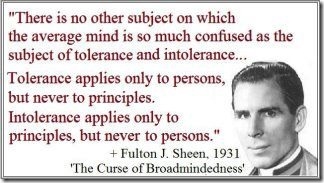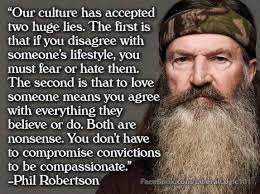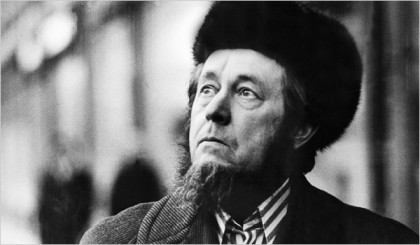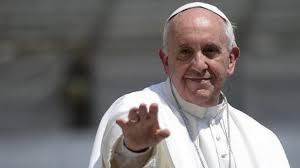Beyond “Love the Sinner, Hate the Sin”
Devra Torres | May 11, 2014 | 9 cmts
I want to continue the conversation inspired by the video The Third Way: Homosexuality and the Catholic Church. (It's mostly been transpiring on Facebook, but feel free to leave comments here, too.)

When he heard my title for this post, my husband asked jokingly if I thought it was time to start hating the sinner and loving the sin.
Well, no. That’s not how I mean “beyond”: dumping a traditional idea and embracing its opposite. Nor do I mean getting “beyond” the categories themselves, the concepts of “sin” and “sinner.”
 People have been laboring to get “beyond” good and evil, truth and falsehood, and male and female for a long time now. It’s getting clearer and clearer how very unlikely "beyondism" is to make things better for anybody, ever.
People have been laboring to get “beyond” good and evil, truth and falsehood, and male and female for a long time now. It’s getting clearer and clearer how very unlikely "beyondism" is to make things better for anybody, ever.
“Love the sin, hate the sinner” isn’t wrong—it’s just that we’ve been saying it so long that it’s time to step back and reexamine what it even means, and what it implies for our real-life dealings with other human beings.
LTSHTS is right in a couple crucial respects:
- It’s precisely because we love the sinner—have his welfare at heart—that we hate the sin. Sin is damaging to persons; it eats away at our freedom and impedes our flourishing. Trying to appease a sinner by calling good evil and evil good does him no favors. Since love involves willing the good of the other, if we love someone, we hate his evil actions.
- Also, the saying clarifies something that increasingly needs clarifying: you can love a person without approving of his actions. This idea was expressed almost a century ago by Fulton Sheen

and more recently by Phil Robertson

So what’s the problem?
One possible source of trouble is the part about “the sinner.”
For one thing, when we talk about “the sinner,” we can unconsciously start thinking that the world is divided up into sinners and non-sinners, In Aleksandr Solzhenitsyn's words,

If only there were evil people somewhere insidiously committing evil deeds, and it were necessary only to separate them from the rest of us and destroy them. But the line dividing good and evil cuts through the heart If of every human being. And who is willing to destroy a piece of his own heart?
Also, in this case, there’s a danger of labeling people with same-sex attraction—those who act on it and those who don’t—as “the sinners,” in a way that singles them out and presumes to judge them as worse than, say, the proud or the self-righteous.
Maybe it would be a step in the right direction to say, “Love the fellow sinner.”
So much for problems with understanding the “sinner” part. There’s one more element that makes trouble: the “love” part.
Some of us have limited ourselves to saying, “Love the sinner? Sure I do: I tell him he’s sinning. That’s genuine love, much more so than coddling him or lying to him.” “Love the sinner” gets reduced to “Tell him he’s a sinner.”
If Pope Francis has taught us anything, though, it’s that approving of good and disapproving of evil doesn't exhaust our mission. We’re not supposed to be roving, self-appointed sinner-spotters, letting everybody know just how unsightly the splinters in their eyes are. As the Pope puts it in Evangelii gaudium, we need to avoid 
a narcissistic and authoritarian elitism, whereby instead of evangelizing one analyzes and classifies others, and instead of opening the door to grace, one exhausts his or her energies in inspecting and verifying.
Our first job is to at least acknowledge, and then to remove, the log in our own eye. There's room for helping other people remove their own splinters, but only after we’ve regained our sight. Removing a splinter, as any mother knows, is a delicate operation.

Many of us, on the other hand, don't need to be told to stop gratuitously proclaiming to people how sinful they are. We don't want the social discomfort, much less conflict and persecution. We limit ourselves to holding the right opinion about the morality of homosexual acts and steering clear of those who seem to be inclined that way.
The trouble is, that's not loving the sinner either. That's avoiding and ignoring the sinner.
So what do we do instead? I've run across two good articles, one by Jen Fulweiler ("A conversation with my gay friend") and one by Richard G. Evans ("Befriending Those with Same-Sex Attraction: One Celibate Man's View") that seem to point in the right direction. One thing is clear: settling for a minimalist understanding of "love" won't cut it.
Maybe I don't really mean "beyond" but "deeper in." We do need a "third way": neither hating the sinner nor loving the sin. My husband was kidding, but too many people are under the impression that those are their only choices. We need to articulate--and live by--something better.

Comments (9)
Michel Esparza
May 12, 2014 11:00am
Congratulations, Devra!
Kate Whittaker Cousino
May 12, 2014 12:23pm
I think "loving the fellow sinner" is definitely a step in the right direction. I think also that sometimes we are so anxious to make Christian life appealing that we jump instantly to facile answers and platitudes instead of honestly admitting to the mystery of suffering and of dying to self. This can be an obstacle to all kinds of seekers, but particularly for homosexual seekers for whom following Christ means quite explicitly taking up a fairly heavy cross of solitude and lack of intimacy. If we are afraid to openly admit to our own crosses, to the difficulty of our own walks with Christ, we are going to seem callous and pharisaical when we urge others to take up theirs.
Devra Torres
May 12, 2014 3:19pm
My mother used to have a homemade bumper sticker on the car--I can't find the exact quote, but it was from some rabbi, and it went "The man who has not suffered--what can he possibly know?" I think one thing about this age where everybody is being forced more and more to be either an "intentional disciple" or not a disciple at all is that we all need to get better at avoiding anything glibbed or canned or oversimplified. No more automatic pilot, no more glossing over the cross.
Katie van Schaijik
May 15, 2014 4:12am
I've come across a lot of this:
Many Christians imagine that we fulfill our obligation to love gays when we denounce homosexual acts and same sex marriage. Meanwhile, we pay no genuine attention and give no care persons with SSA at all. (And where there is no attention or care given to concrete individuals, there's no love, no matter how much "good will" we might claim.)
The new openness about homosexuality has done two important things for people like me.
1. Made us aware of the pain and suffering, confusion, and alienation-from-others that those with SSA typically experience. It's made us aware of our failure of love and compassion, and much more willing to reach out in friendship and solidarity.
2. It's brought to the fore many stories of the miseries involved in the gay lifestyle.
This is still a taboo topic in the mainstream, where there is enormous pressure to pretend that homosexuality is completely normal and no different from conjugal love. That, too, is a lie.
Katie van Schaijik
May 15, 2014 4:15am
I finally saw the film and thought it really great, with the minor stylistic complaint that the music at the end seems oddly triumphalistic and propagandistic or something.
I'm so grateful to those willing to share their testimonies. We need lots more of those!
Devra Torres
May 15, 2014 3:22pm
Yes, the "new openness," not to mention the coming out of my brother, has made me rethink a lot of things, especially as a mother. My old approach was to shield my kids from the existence of certain disorders as long as possible--the grain of truth in that was my sense that they didn't need to be educated about every possible sin or disorder or perversion. If the word "gay" came up, I would explain that some people have something wrong with them that makes them feel about people of their own gender the way most people feel about the opposite one. I didn't get into whose fault that was, or if it was anybody's, and I don't think I encouraged further conversation. This seems much more inadequate to me now.
Rhett Segall
May 15, 2014 7:42pm
Do you think an analogy between the Christian response to homosexuals can be made with the Christian response to polygamy? I understand this is a serious issue in Africa. My thinking is that polygamy is deeply ingrained in certain African cultures such that those involved in polgamy would see no conflict with that mode of marriage and intimacy with God. Telling such people that they must be monogamous to be a Christian must, it seems to me, come across to them as a non-starter.
What should the pastoral actons of the Catholic Church be towards those people involved in polygamous relationships who feef no conflict between that and following Christ?
Does this pastoral attitude offer any insights into the pastoral attitudes of the Catholic Church towards those with SSA?
Devra Torres
May 21, 2014 12:28am
Rhett, that's a really interesting question. I don't know the answer. A cultural tradition, of course, is a different kind of thing than a sexual inclination, but there are similarities, too. I remember Richard John Neuhaus once observing how we (Americans) have such a hard time understanding how some African peoples can practice polygamy while embracing Christianity, a religion that so clearly forbids it. But he said (if I'm remembering correctly) that it's really not any more strange than the way we conveniently ignore sayings like "let him who has two coats give to him who has none."
Nanda
Jun 8, 2015 7:34pm
Again, Devra, many thanks: for pointing out a distinction with a difference, and for calling me to deeper prayer with those who struggle.